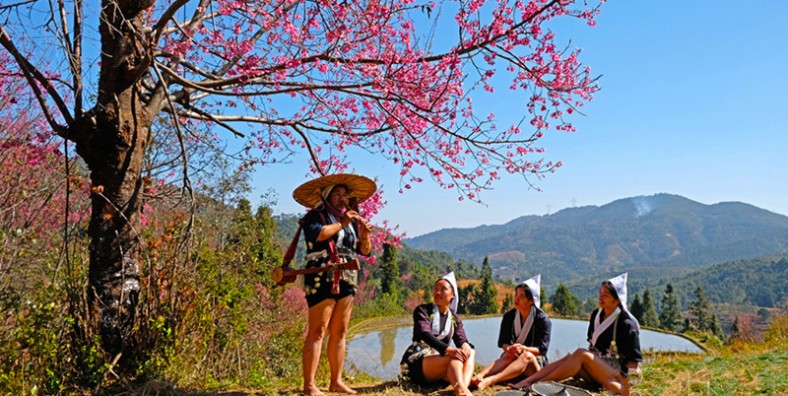
Puma Village of Yiche Ethnic People in Honghe County, Honghe
Puma Village (浦玛村, Pǔmǎ Cūn) is located on the west side of Dayang Street (大羊街, Dàyángjiē), within the Tuo Sha Administrative Village (妥赊行政村, Tuǒshā Xíngzhèngcūn) of Dayang Street Township (大羊街乡, Dàyángjiē Xiāng). Approximately 0.5 kilometers from Dayang Street Township, this village is home to the Yiche (奕车, Yìchē) ethnic group, a pure branch of the Hani (哈尼族, Hānizú) people, consisting of over 910 individuals from 175 farming households. The picturesque surroundings of Puma Village, characterized by verdant mountains and clear waters, present a captivating natural landscape that enhances its ancient and tranquil rural charm. The village exemplifies Yiche culture, preserving rich traditions that embody the essence of the Hani people.
The villagers uphold a vibrant cultural heritage encompassing agriculture, religion, rituals, history, calendar, folk customs, clothing, marriage, and cuisine. The housing in Puma Village primarily consists of earthen and timber structures, with 115 households in traditional homes, 12 in brick-concrete houses, and 48 in brick-wood constructions. Recent years have seen Puma designated as a characteristic village, benefiting from governmental support that includes improved access roads, stone-paved pathways, cultural activity rooms, and cultural performance teams, aiming to integrate the village’s cultural and natural landscapes with Yiche traditions while promoting economic growth and preserving ethnic heritage and ecological integrity. New facilities like mushroom house pavilions and a folk activity square are under construction to enhance visitors’ experiences.
Geography and Climate
Upper Puma Village (上浦玛村, Shàng Pǔmǎ Cūn)
Upper Puma Village is located in the mountainous area of Tuo Sha Administrative Village (妥赊行政村, Tuǒshā Xíngzhèngcūn), Honghe County (红河县, Hónghé Xiàn), Yunnan Province (云南省, Yúnnán Shěng). It is roughly 1.6 kilometers from the Tuo Sha Village Committee (妥赊村委会, Tuǒshā Cūnwěihùi) and about 2 kilometers from the township government. Spanning an area of 0.74 square kilometers at an elevation of 1770 meters, the village experiences an average annual temperature of 14.7°C, with an annual precipitation of about 900 millimeters, making it conducive for cultivating rice and corn.
Lower Puma Village (下浦玛村, Xià Pǔmǎ Cūn)
Lower Puma Village is also located within Tuo Sha Administrative Village (妥赊行政村, Tuǒshā Xíngzhèngcūn), nestled in the mountains. It lies 1 kilometer from Tuo Sha Village Committee (妥赊村委会, Tuǒshā Cūnwěihùi) and 1.4 kilometers from Dayang Street Township (大羊街乡, Dàyángjiē Xiāng). Covering an area of 0.71 square kilometers and situated at an elevation of 1740 meters, this village enjoys an average annual temperature of 14.8°C and substantial rainfall, also favoring the growth of rice and corn.
About the Yiche People (奕车人, Yìchē Rén)
The Yiche people (奕车人, Yìchē Rén) are a branch of the Hani ethnic group (哈尼族, Hānizú), regarded as one of the oldest subdivisions, with fewer than 20,000 members primarily found in Honghe County (红河县, Hónghé Xiàn), particularly in Dayang Street (大羊街, Dàyángjiē), Langdi (浪堤, Làngdī), and Chegu (车古, Chēgǔ). The Yiche people’s long history of migration and their interactions with nature have led to the development of a rich culture characterized by its original, mysterious, and brilliant qualities. Their cultural practices encompass agriculture, religion, rituals, folk customs, clothing, marriage, and cuisine, showcasing profound sociological, folkloristic, and ethical dimensions.
Festivals
Yang’ana Festival (仰阿娜节, Yǎngānà Jié)
The “Yang’ana” festival (仰阿娜节, Yǎngānà Jié) celebrates the hardworking Yiche people at the end of the spring plowing season. Young men and women gather at Mengzi Hongdu Mountain (孟子轰都山, Mèngzǐ Hōngdū Shān) to engage in leisure and entertainment. The festival, which primarily focuses on the Yiche girls, is also known as the “Girls’ Festival,” occurring on the first monkey day in the third lunar month after rice planting.
In the morning, respected elders conduct rituals at the mountain top to pray for abundant harvests and health. After 10 a.m., Yiche girls dress in their most beautiful attire, including white pointed hats (帕常, Pàcháng) and layered clothing. Holding white umbrellas and musical instruments, they gather to sing and dance, sharing songs that reflect their history and life experiences.
Ku Zhazha Festival (矻扎扎节, Kūzhāzhā Jié)
The annual “Ku Zhazha” festival (矻扎扎节, Kūzhāzhā Jié) lasts five days, starting on the first monkey day in the fifth lunar month. The first day involves selecting a sacred pine tree for the grinding ceremony, with livestock slaughtered for feasting. The climax of the festival occurs from the third to the fifth day, with mutual feasting, grinding competitions, and lively games, showcasing vibrant cultural expressions.
Zhalete Festival (扎勒特, Zhālètè)
“Zhalete” (扎勒特, Zhālètè), or “October New Year,” begins on the first day of the dragon in the lunar calendar’s tenth month and lasts for six days. This grand festival marks the Hani people’s transition into a new year, filled with vibrant activities, fresh clothing, feasts, and the sounds of fireworks, dances, and songs that create a unique symphony of rural life.
How to Get There
Puma Village (浦玛村, Pǔmǎ Cūn) can be accessed by taking a bus from Honghe County (红河县, Hónghé Xiàn) to Dayang Street Township (大羊街乡, Dàyángjiē Xiāng). It is recommended to confirm local transport schedules in advance, as services may vary.
Travel Tips
- Best Time to Visit: Spring and autumn are ideal for pleasant weather and vibrant scenery.
- Cultural Sensitivity: Respect local customs and ask for permission before taking photos of individuals.
- Accommodation: Limited accommodation options are available in the village; consider planning overnight stays in nearby towns or villages.
- Local Cuisine: Don’t miss out on tasting local dishes to fully experience the authentic flavors of Yiche culture.
- Language: Familiarize yourself with basic Mandarin phrases, as English may not be widely spoken.
- Guided Tours: Consider joining guided tours to enhance your understanding of the local culture and history.
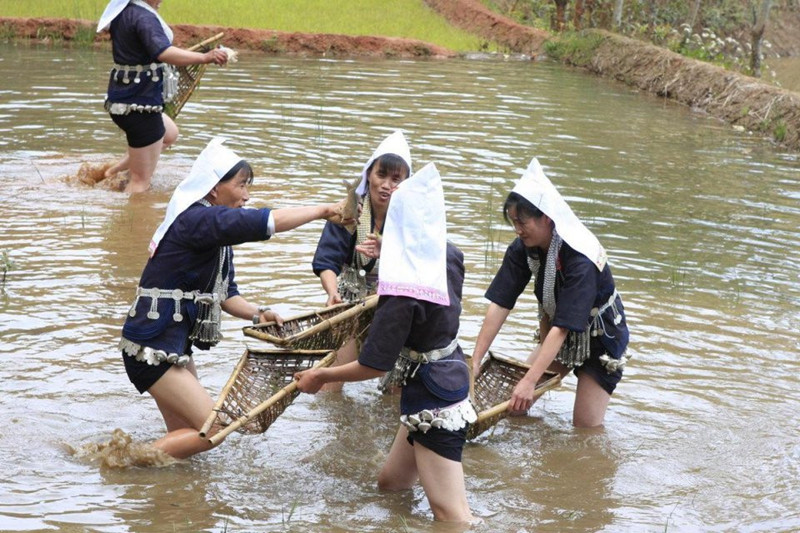
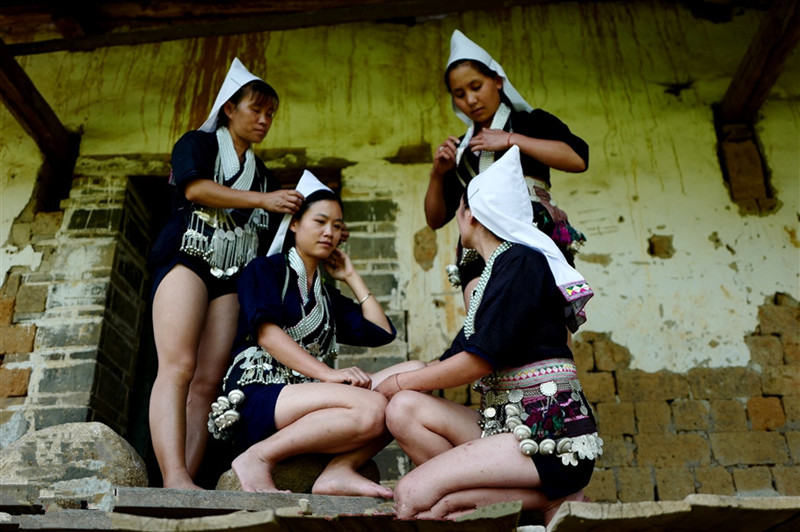
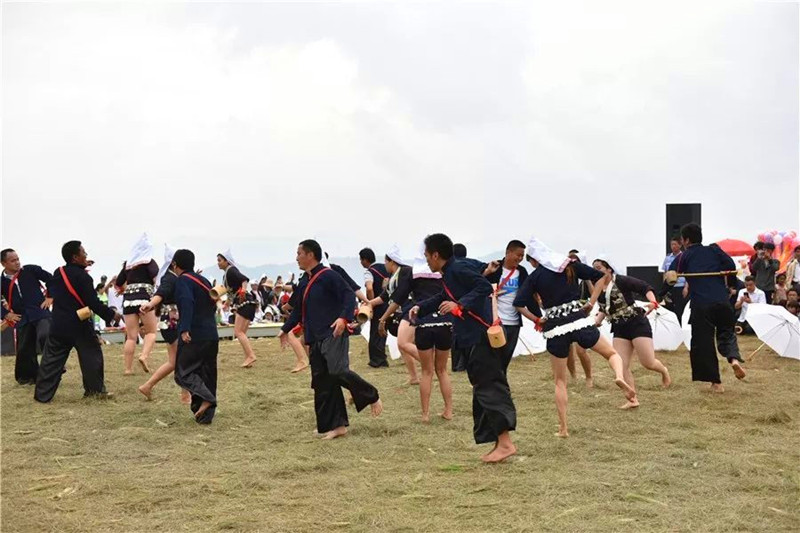
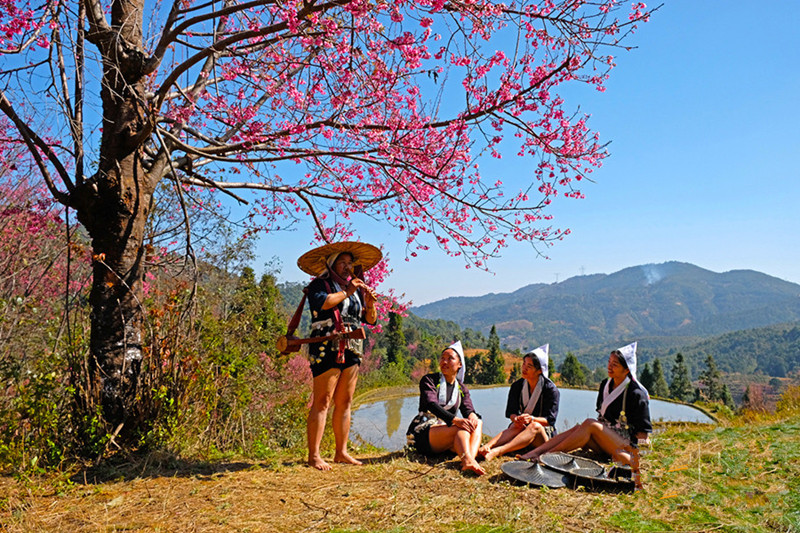
Location:

 7 Days GolfingTour
7 Days GolfingTour
 8 Days Group Tour
8 Days Group Tour
 8 Days Yunnan Tour
8 Days Yunnan Tour
 7 Days Shangri La Hiking
7 Days Shangri La Hiking
 11 Days Yunnan Tour
11 Days Yunnan Tour
 6 Days Yuanyang Terraces
6 Days Yuanyang Terraces
 11 Days Yunnan Tour
11 Days Yunnan Tour
 8 Days South Yunnan
8 Days South Yunnan
 7 Days Tea Tour
7 Days Tea Tour
 8 Days Muslim Tour
8 Days Muslim Tour
 12 Days Self-Driving
12 Days Self-Driving
 4 Days Haba Climbing
4 Days Haba Climbing
 Tiger Leaping Gorge
Tiger Leaping Gorge
 Stone Forest
Stone Forest
 Yunnan-Tibet
Yunnan-Tibet
 Hani Rice Terraces
Hani Rice Terraces
 Kunming
Kunming
 Lijiang
Lijiang
 Shangri-la
Shangri-la
 Dali
Dali
 XishuangBanna
XishuangBanna
 Honghe
Honghe
 Kunming
Kunming
 Lijiang
Lijiang
 Shangri-la
Shangri-la
 Yuanyang Rice Terraces
Yuanyang Rice Terraces
 Nujiang
Nujiang
 XishuangBanna
XishuangBanna
 Spring City Golf
Spring City Golf
 Snow Mountain Golf
Snow Mountain Golf
 Stone Mountain Golf
Stone Mountain Golf
